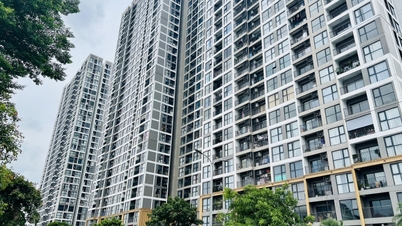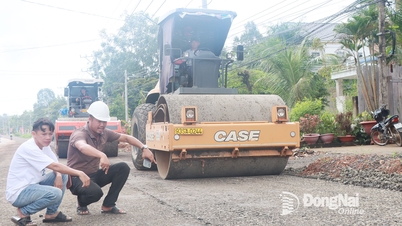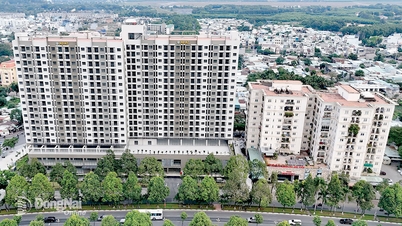At the end of the year, residential real estate transactions are at their busiest of the year. However, if not careful, land buyers and investors can easily fall into the trap of land brokers.
Talking to reporters, Mr. Do Ngoc Thang - Regional Sales Director at OneHousing shared: Legal risks, "overpriced" prices, and unprofessional brokers are the three traps that set traps for home buyers at the end of the year.

Mr. Do Ngoc Thang - Regional Sales Director at OneHousing. (Photo: PH)
Revealing the three traps that home buyers face at the end of the year
With the general sluggishness of real estate last year, how is the residential land market developing at the end of this year, sir?
- Regarding the residential land sector, from the past to the present, in Hanoi with 4 inner-city districts and currently 12 inner-city districts, it has not been affected much by market trends of increase or decrease.
Inner city - where land fund cannot be expanded but population is still increasing and most importantly, the demand is real demand - for living, investing, doing business, renting... always exists, so inner city real estate prices are almost unchanged, sometimes only increase slightly but increase steadily, home buyers do not worry about losses and have a safe haven for good cash flow.
From now until the end of the year, residential real estate transactions are the most active - that is also true to annual practice.
With the mentality of wanting to close the deal quickly, what risks can home buyers face when buying a home at the end of the year? What traps are waiting for home buyers in the current market?
- The risks of buying a house are not only at the end of the year, the eternal problem of real estate buyers is first the legality, second the valuation, third the broker's advice.
Legally, customers may encounter risks when transacting houses without a certificate, without a certificate, buying and selling with handwritten documents or notarized documents, sharing the certificate, the certificate is in a black credit place, or the homeowner is depositing for 2-3 people... The most common risk is that the homeowner holds the red book to borrow from a financial institution - all must know the sale papers or write a deposit contract.
If the broker does not check carefully for the customer, there will be many risks for the buyer and bring unpredictable consequences because most of the real estate values are many billions of dong.
Second is about price. At the end of the year, there will be a lot of information about sales: "Buying a house because of debt, urgent sale, shocking price at the end of the year..." It is very likely that this information is aimed at greed for profit. If the brokers advise you that the price is much cheaper than the market price, I definitely advise you to question it and be wary of things that are suddenly cheap. Everything has its price.
For brokers, the initial story of "fishing" about bargain-priced, shockingly discounted properties... but in fact it is not true, it is a trick to attract the attention of buyers and then lead them to other properties - is no longer a new story, even has become a practice in many markets. Or brokers taking advantage of the buyer's psychology of closing quickly to raise prices, "eating" the difference is also not uncommon.

"Land brokers" have many tricks at the end of the year. (Photo: VNT)
In such a “gray area” market, buyers can face risks at any time. As an expert with decades of experience, what advice can you give to home buyers?
- Residential real estate transactions are still happening every day, the most important thing for buyers when entering the market is to research carefully to identify the risks they may encounter.
Regarding the legality of real estate, experience shows that buyers need to carefully check the red book and the information on the book must be accurate before making a deposit. And of course, transactions should be made through a reputable brokerage firm, because they are the ones with the best expertise to ensure the legality of that real estate.
Regarding the price, today go see apartment A, apartment B, apartment C with such floor plan, such location, such alley,... then you can estimate the average price in this area from about how much? If the customer meets a professional, knowledgeable broker who can advise us on why we should buy this location, how much the price here is, what the legal transaction process is like?... then we will feel more secure.
In residential transactions, the professionalism of the broker is extremely important. Besides the legality and price, as I mentioned above, the broker always appears in the whole process of the customer, from searching, visiting the house to carrying out the purchase and sale procedures.
So, right from the first meeting, through some questions, you can check if they have the profession, are dedicated, understand the area, etc.
Meeting a professional broker working for a large and reputable unit or enterprise can help customers minimize all risks in the residential land transaction process, because then the brokerage unit itself is responsible for the customer's transaction, instead of an independent broker.
Finding "opportunity in danger" in the residential real estate market
As you mentioned, there are still many customers who recognize the opportunity to invest in residential real estate. In your opinion, what is the price segment that buyers can aim for at the end of this year, and is this market really sustainable for buyers' cash flow?
- The price segment when investing in residential real estate depends entirely on the available finance of the buyer. Because in the market, besides large brokerage units that have close cooperation with banks, the rest often do not have financial solutions for residential buyers.
For residential land in inner-city districts, the price segment with the strongest transactions is from 3-6 billion VND. Vietnamese people have a mentality of playing it safe and staying put, many people still prefer to live in houses on the ground. For houses in alleys, motorbikes can enter, the price is about 100 million/m2 to 120 million/m2, a 50m2 house is about 5 billion, built with 5 floors, 35-40m2 per floor, the usable area is also up to nearly 200m2.
The supply in the center of Hanoi has almost no big fluctuations because the land fund cannot expand, the inner-city residential transactions will rotate according to demand. Supply and demand are always balanced regardless of the fluctuations of the real estate market in general. When someone wants to sell, there will be someone who wants to buy and vice versa.
For example, when I first got married, I only wanted to buy a 30m2 house, but after 3-5 years of doing business and earning a lot of money, I naturally wanted to find a larger place. At this time, I would want to sell and then I would continue to want to buy. Or many people live in a big house, but if their business is difficult, they can sell their big house and move to a smaller house to get capital to do business... Supply and demand for residential real estate are always available. Even I have lived in 5 houses.

The price segment when investing in residential real estate depends entirely on the available finances of the buyer. (Photo: OH)
Is this true for the suburban land segment, which was also very popular with investors a few years before the market boomed?
- About 2-3 years ago, investors investing in suburban real estate enjoyed hot profits, like "when the tide rises, the boat rises".
However, we see previous lessons, in 2010 real estate in the suburbs increased rapidly but when the bubble burst, it started to decline and many investors struggled, even went bankrupt, selling many houses at that time... This situation repeated in 2022 and early 2023, news of selling at a loss to pay off credit debt was widespread.
In my opinion, when the market recovers, it will first be in the segment with real housing demand such as apartments and townhouses. The suburban land will face more difficulties when the National Assembly recently passed the Law on Real Estate Business, which "tightens" the subdivision and sale of land to avoid speculation.
As legal regulations are increasingly improved, promoting market transparency, the suburban land segment is becoming less and less attractive in customers' investment portfolios.
Finally, do you have any advice for home buyers this year-end?
- Advice for buyers is that if there is a product that meets the criteria, meets the homeowner who needs to sell, is willing to sell, has standard legal conditions, has available finances, etc., then they should buy it so they can sleep soundly, without having to worry about going to see a house today, going to see a house tomorrow, focusing that time on business, making a happy and warm Tet, because inner-city residential land has never had a price reduction.
Thank you very much!
Source




![[Photo] Binh Trieu 1 Bridge has been completed, raised by 1.1m, and will open to traffic at the end of November.](https://vphoto.vietnam.vn/thumb/1200x675/vietnam/resource/IMAGE/2025/10/2/a6549e2a3b5848a1ba76a1ded6141fae)


































































































Comment (0)